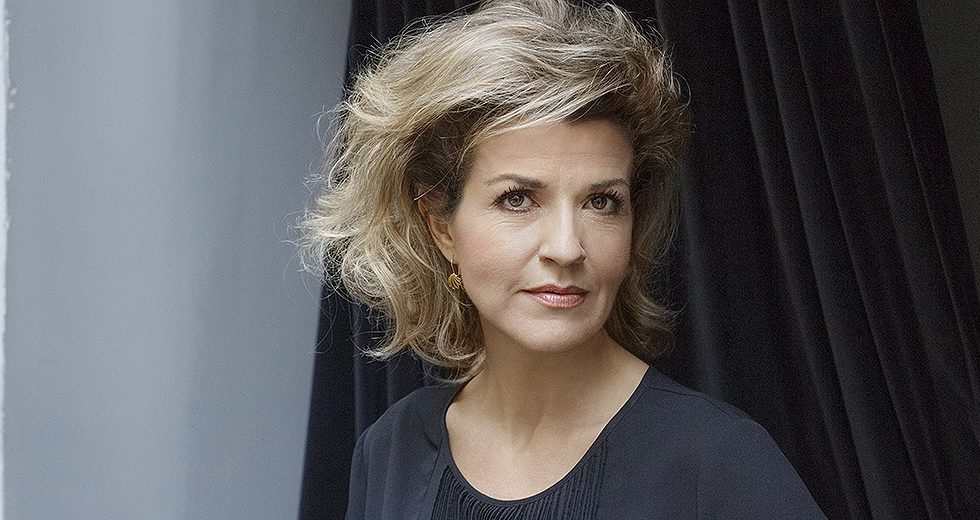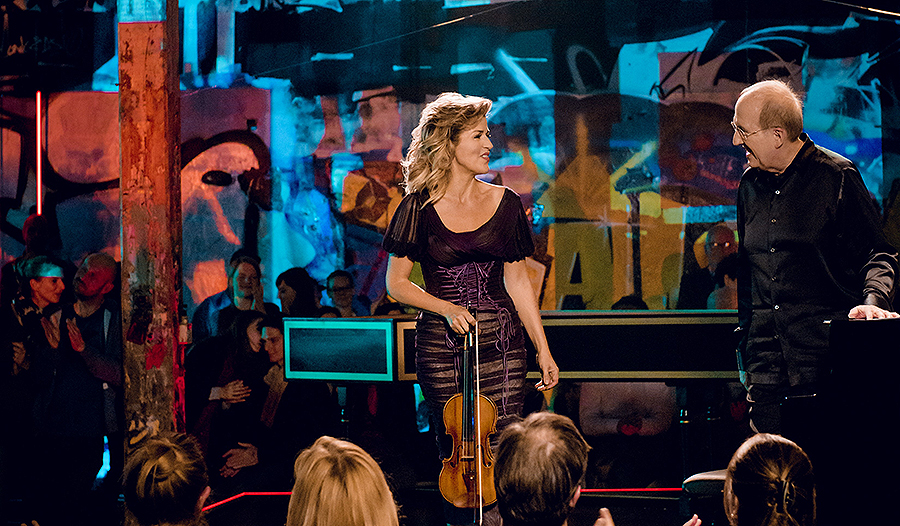
The international world of violin virtuosos has its up-and-comers, also-rans and middle-of-the-roaders, but Anne-Sophie Mutter has long remained one of the fieldвҖҷs biggest and brightest stars. A testament to her elite standing was Deutsche GrammophonвҖҷs decision last year to release вҖңMutterissimo вҖ” The Art of Anne-Sophie Mutter,вҖқ a two-album set of highlights that she chose from her dozens of recordings. The release marked the 40thВ anniversary of her solo debut in 1976 at age 13 at the Lucerne Festival. вҖңMaybe I would have wished for even more contemporary music,вҖқ she said. вҖңBut itвҖҷs a good voyage through the violin repertoire, with a lot of chamber music in it as well as some of the really flamboyant, virtuosic pieces like the Korngold [Concerto].вҖқ
Mutter will return to March 29 to Orchestra Hall for a recital as part of the Symphony Center Presents Chamber Music Series. The German violinist will be joined by pianist Lambert Orkis, with whom she has collaborated regularly since 1988. вҖңHe is just an incredibly sensitive, imaginative, intelligent and, in the same moment, instinctive musician,вҖқ she said of Orkis, whom she won one of her four Grammy Awards in 2000 for вҖңBeethoven: The Violin Sonatas,вҖқ a recording of the complete set of the composerвҖҷs works in that form. вҖңItвҖҷs very difficult to find a musician who has high analytical power and at the same moment has a great gut feeling for music, for phrasing and who is breathing with you, which in chamber music is really a gift.вҖқ She praises his ability to bring out the rich threads and deep textures of a piece and his deep understanding of how a violin works and what its role is in each selection. вҖңThe longer we play together I wouldnвҖҷt say [the communication is] more profound, but we can delve into details where you can only go with a musician you totally trust.вҖқ

Of her longtime collaborator Lambert Orkis, Anne-Sophie Mutter says, вҖңItвҖҷs very difficult to find a musician who has high analytical power and at the same moment has a great gut feeling for music.” | Photo: Stefan Hoderath/Deutsche Grammophon
Throughout 2017, Mutter will continue to look back at her important early debuts. On May 27, she will join guest conductor Riccardo Muti and the Berlin Philharmonic for a celebration of the 40thВ anniversary of her first performance with that orchestra and its legendary music director Herbert von Karajan. That inaugural concert, presented as part of the Salzburg Whitsun Concerts (now the Salzburg Whitsun Festival), was the beginning of a still-flourishing collaboration with the orchestra. вҖңThat is something for me that will be a very special moment,” she said. “And, yes, of course, Riccardo Muti is one of my all-time favorite conductors.вҖқ
Together they will perform TchaikovskyвҖҷs ever-popular Violin Concerto, a work she performed in Salzburg last year with Muti and the Vienna Philharmonic. вҖңDoing Tchaikovsky with him is boiling hot, thatвҖҷs for sure,вҖқ he said. That same debut will be marked in June at this yearвҖҷs Whitsun Festival, when she will play chamber music with the Mutter Virtuosi, an informal group of top young musicians who have received scholarships from her foundation.
One of the biggest changes Mutter has seen in the classical music world is a вҖңmore positive and open-minded approachвҖқ to contemporary music, although such acceptance is still not at the level she would like it to be. She is an avid champion of new music, having presented the world premieres of 24 works by such prominent composers as Henri Dutilleux, Sofia Gubaidulina, Witold LutosЕӮawski and Krzysztof Penderecki. Although audiences are more accepting and presenters are more willing to present such music, she said, economic reasons, such as the cost of extra rehearsals that such repertoire can require, often keep it from being performed.
At the same, she decries the decline of music education in schools in many countries, including Germany; education is critical because music can serve as a вҖңsocial binding materialвҖқ and bridge different cultures and faiths. Performers, orchestras and presenters have had to try to fill this void as best they can. вҖңSadly, what one doesnвҖҷt know, one doesnвҖҷt miss,вҖқ Mutter said. вҖңItвҖҷs like great literature. If you never read a Dostoevsky, you just donвҖҷt what you are missing. I see with great that fear that in school education in some parts of Europe, children get trained in what will make you make you money later in life but not necessarily in what will make you a broad-minded human being with an ethical conscience and an understanding for the necessity of art to express your own creativity and also to find fulfillment.вҖқ
Another important 2017 concert for the violinist occurred in February, when she participated in the Orchestre National de FranceвҖҷs tribute to German conductor Kurt Masur, who served as its music director from 2002 through 2008. Masur, who died in 2015 at age 88, also served as music director of the New York Philharmonic from 1991 through 2002 and was the kapellmeister of the Leipzig Gewandhaus Orchestra from 1970 through 1996.
вҖңHe was a very important political figure in Germany when our [Berlin] Wall fell,вҖқ Mutter said. вҖңHe was really responsible for a calm climate there. People would march every Monday in calm protests, and he was something like the mayor of Leipzig, one could say. He had tremendous power as a human being to bring people together and bring the good out in us.вҖқ
She views Masur as a modern-day champion of human freedom and fellowship, ideas espoused by German philosopher, playwright and poet Friedrich Schiller, who penned Ode to Joy,В featured in the finale of BeethovenвҖҷs Ninth Symphony. вҖңHe has become and he always will be an ideal of what a musician should be not only as a person onstage, as a conductor, as a musician, but also as human being taking part in shaping society as a good place for everyone.вҖқ
Mutter comes to North America as often as four times a year, alternating such global trips with tours in Australia and the Far East. Her concert at Orchestra Hall is part of a seven-city recital tour that begins March 26 in Davies Symphony Hall in San Francisco and ends April 8 at the Kennedy Center in Washington, D.C.
Her program opens with ClockworkВ (1989) by Sebastian Currier, a composer that Orkis got to know when the two served as jurors for a music competition. Currier has since become one of MutterвҖҷs favorite contemporary composers, and he has written several works for her. This piece was not composed for Mutter, but she and Orkis began playing it in the early 1990s and have kept it in their repertoire since. The highly rhythmic composition starts with the sound of one clock, Mutter said, then everything goes вҖңtotally nuts.вҖқ вҖңSometimes, Lambert has three rhythms and only two hands, and the violin is doing a fourth one,” she said. “So metrically, itвҖҷs quite demanding. ItвҖҷs very witty. ItвҖҷs fabulously virtuosic. ItвҖҷs great fun to play.вҖқ
The music of Mozart has been a central part of MutterвҖҷs musical life since the beginning of her career, and she almost always includes a work by him on her recitals. For this concert, she will perform the Violin Sonata in A Major, K. 526, one of the composerвҖҷs late sonatas and one that was believed to have been influenced by his fatherвҖҷs death. The work features a вҖңtightly knit dialogueвҖқ between the two players. вҖңItвҖҷs like the piano starts the sentence, and the violin finishes it and vice versa,” she said. “ItвҖҷs very intimately written. ItвҖҷs a little opera with this wonderful presto-ish finale which is very delicate. Mozart is just the crown of composers.вҖқ
Next comes Ottorino RespighiвҖҷs Violin Sonata in B Minor, which Mutter describes as one of her all-time favorites. She and Orkis are returning to the work for the first time in 16 years. вҖңItвҖҷs such a richly orchestrated score, and one of the really extraordinary pieces and once again a piece that is not overexposed to say the least, and we are excited to bring it to America,” she said. “We love to play Mozart, but also Currier and Respighi, who need to be heard more.вҖқ
Closing the program with what Mutter calls a вҖңfireworks endingвҖқВ is Camille Saint-SaГ«nsвҖҷ вҖңfestive and funвҖқ Introduction and Rondo Capriccioso.
Kyle MacMillan, former classical music critic of the Denver Post, is a Chicago-based arts journalist.
TOP: This season, violinist Anne-Sophie Mutter is celebrating the 40th anniversary of her solo debut. | Photo: Monika Höfler